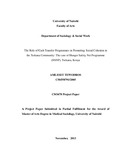| dc.description.abstract | Cash transfer (CT), a mechanism for the provision of cash payments directly to the very poor, are increasingly perceived as an effective tool for poverty alleviation especially among vulnerable groups. We are living in a context of high vulnerability, and consequently it is an era in which comprehensive social protection that guarantees citizens of basic minimum standard of living is on top of global and national development agenda. The Hunger Safety Net Programme (HSNP) is a social protection project being conducted in the Arid and Semi-Arid Lands (ASALs) of northern Kenya. The ASALs are extremely food-insecure areas highly prone to drought, which have experienced recurrent food crises and food aid responses for decades. The HSNP is intended to reduce dependency on emergency food aid by sustainably strengthening livelihoods through cash transfers. Whereas several studies and reviews are carried out to assess the socio-economic impact of the programme on beneficiaries, this study uniquely attempted to understand the role of HSNP CT in promoting social cohesion among communities in Turkana, Kenya.
The specific objectives of the study were: To examine the community‘s level of awareness about HSNP CT and its processes, to assess the role of cash transfer in promoting social cohesion among the communities in Turkana, to analyse the effects of HSNP CT in enhancing reciprocal relationship at the household, community and state level and to examine the perception of the community on the 3 HSNP targeting methods in view of their fairness and contribution to social cohesion. The study was carried out in Turkana Central District, Central and Turkwel divisions. A cross sectional design was employed and it purposively selected 80 beneficiaries and conveniently selected 45 non-beneficiaries. The study collected both quantitative and qualitative data through informant interviews and questionnaires. Twenty key informants were interviewed and their responses are integrated in the analysis. Data analysis was done using SPSS and descriptive analysis were done. For both beneficiaries and non beneficiaries the average household size was 6.08 persons per household which is higher than the national average of 4.4 in the 2009 population census. The HSNP processes disbursed payment to beneficiaries in cycles of Kshs 3000 bimonthly and most of the beneficiaries were in their
ix
tenth cycle at the time the field work took place. The findings of this study revealed that the HSNP used three targeting methods that comprised community based, social pension and dependency ratio and both beneficiaries and non beneficiaries highly preferred the community based targeting which had employed open and transparent processes in beneficiary identification and hence promoted cohesion. The study also revealed a high degree of awareness among beneficiaries and non-beneficiaries alike about the purposes and mechanisms of beneficiary identification. Beneficiaries showed improvements across all the five livelihood areas: Increased number of meals, ability to access health care, improved ability to withstand the effects of drought, ability to send children to school and improved shelter. There was collaboration between beneficiaries and non beneficiaries in several activities and evidence showed that this was further enhanced by the availability of cash in some households. HSNP has promoted innovation in business and diversification of livelihoods. The beneficiaries are buying more livestock; and some women beneficiaries have started small kiosk (shops), and involved in petty trading. The CT has also improved state citizen relationship with increased interaction and trust harnessed through rights awareness that accompanied the CT programme. Changes of perception were realized where community‘s response to government mobilization on public issues has risen and there is increased participation in meetings organised by government barazas. The CT has also reduced the gap between the haves and have not‘s, as the beneficiaries are regarded worthy and their opinions are considered. No evidence was found that the CT has led to the erosion of the traditional roles of elders hence resulting in disharmony. It has to the contrary enhanced their role in conflict resolution, performing of traditional rituals, making important decisions that affect families and communities. On the other hand the CT has also enhanced the unification of families as testimonies from respondents indicated a number of young people returning from towns such as Eldoret and Kitale. The study concludes that improved economic wellbeing increases capability and willingness to voluntarily engage in reciprocal support and hence the study recommends increasing the coverage of the cash transfer programme will go a long way in promoting social cohesion and thereby strengthen state citizen relationship. | en |

